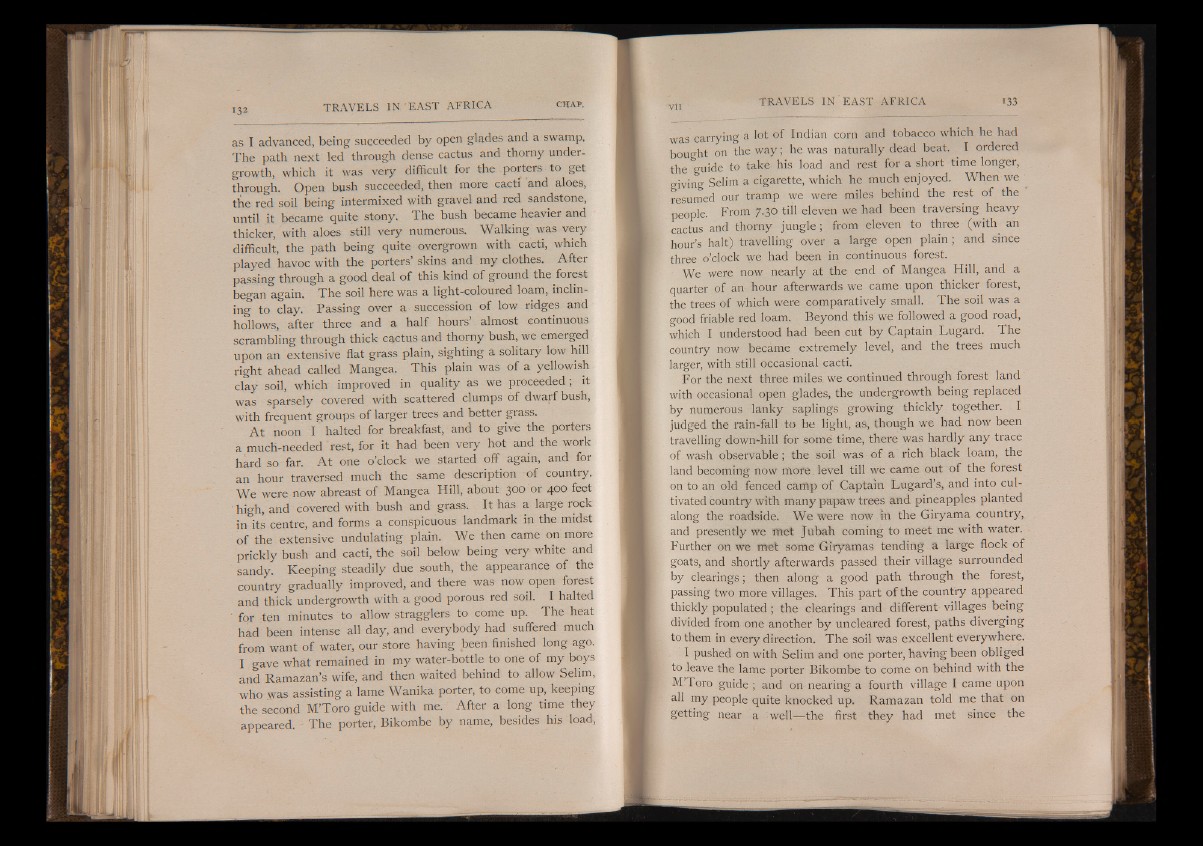
as I advanced, being succeeded by open glades and a swamp.
The path next led through dense cactus and thorny under-
growth, which it was very difficult for the porters to get
through. Open bush succeeded, then more cacti and aloes,
the red soil being intermixed with gravel and red sandstone,
until it became quite stony. The bush became heavier and
thicker, with aloes still very numerous. Walking was very
difficult, the path being quite overgrown with cacti, which
played havoc with the porters’ skins and my clothes. After
passing through a good deal of this kind of ground the forest
began again. The soil here was a light-coloured loam, inclining
to clay. Passing over a succession of low ridges and
hollows, after three and a half hours’ almost continuous
scrambling through thick cactus and thorny bush, we emerged
upon an extensive flat grass plain, sighting a solitary low hill
right ahead called Mangea. This plain was of a yellowish
clay soil, which improved in quality as we proceeded; it
was sparsely covered with scattered clumps of dwarf bush,
with frequent groups of larger trees and better grass.
A t noon I halted for breakfast, and to give the porters
a much-needed rest, for it had been very hot and the work
hard so far. A t one o’clock we started off again, and for
an hour traversed much the same description of country.
We were now abreast of Mangea Hill, about 300 or 400 feet
high, and covered with bush and grass. It has a large rock
in its centre, and forms a conspicuous landmark in the midst
of the extensive undulating plain. We then came on more
prickly bush and cacti, the soil below being very white and
sandy. Keeping steadily due south, the appearance of the
country gradually improved, and there was now open forest
and thick undergrowth with a good porous red soil. I halted
' for ten minutes to allow stragglers to come up. The heat
had been intense all day, and everybody had suffered much
from want of water, our store having been finished long ago.
I gave what remained in my water-bottle to one of my boys
and Ramazan’s wife, and then waited behind to allow Selim,
who was assisting a lame Wanika porter, to come up, keeping
the second M’Toro guide with me. After a long time they
appeared. The porter, Bikombe by name, besides his load,
was carrying a lot of Indian corn and tobacco which he had
bought on the way; he was naturally dead beat. I ordered
the guide to take his load and rest for a short time longer,
giving Selim a cigarette, which he much enjoyed. When we
resumed our tramp we were miles behind the rest of the
people. From 7.30 till eleven we had been traversing heavy
cactus and thorny jungle; from eleven to three (with an
hour’s halt) travelling over a large open plain; and since
three o’clock we had been in continuous forest.
We were now nearly at the end of Mangea Hill, and a
quarter of an hour afterwards we came upon thicker forest,
the trees of which were comparatively small. The soil was a
good friable red loam. Beyond this we followed a good road,
which I understood had been cut by Captain Lugard. The
country now became extremely level, and the trees much
larger, with still occasional cacti.
For the next three miles, we continued through forest land
with occasional open glades, the undergrowth being replaced
by numerous lanky saplings growing thickly together. I
judged the rain-fall to be light, as, though we had now been
travelling down-hill for some time, there was hardly any trace
of wash observable; the soil was of a rich black loam, the
land becoming now more , level till we came out of the forest
on to an old fenced camp of Captain Lugard’s, and into cultivated
country with many papaw trees and pineapples planted
along the roadside. We were now in the Giryama country,
and presently we met Jubah coming to meet me with water.
Further on we met some Giryamas tending a large flock of
goats, and shortly afterwards passed their village surrounded
by clearings; then along a good path through the forest,
passing two more villages. This part of the country appeared
thickly populated; the clearings and different villages being
divided from one another by uncleared forest, paths diverging
to them in every direction. The soil was excellent everywhere.
I pushed on with Selim and one porter, having been obliged
to leave the lame porter Bikombe to come on behind with the
M’Toro guide ; and on nearing a fourth village I came upon
all my people quite knocked up. Ramazan told me that on
getting near a well— the first they had met since the